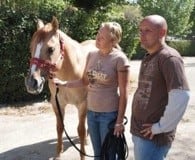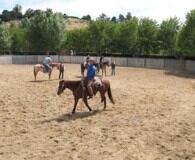Discovery Communications owns and operates Military Channel and Animal Planet, cable networks with different programming mandates. It seems unlikely that their content would overlap, yet it does in a new documentary. “Horse Sense and Soldiers” follows a “horse whisperer” working with Iraq War veterans suffering from PTSD (post-traumatic stress disorder).
Arranged psychological encounters as “info-tainment” are a well-worked angle of reality television, and one must always approach these programs with a bit of skepticism. “Horse Sense and Soldiers” pays off, however, because it stays true to its design and succeeds in its execution.

Three Iraq War veterans, two men and a woman, are introduced to the Join-Up concept of horse training by the concept’s innovator and trademark owner, Monty Roberts, at his Solvang, California, Flag Is Up Farms. The three veterans all suffer from PTSD and have voluntarily decided to devote a few days of their lives trying to relate to horses as therapy. In the documentary we learn that their success in coping with life back home, their families and surroundings is not going well, so they are willing to try something new.
Monty Roberts grew up around horses and made his passion a life’s work in show riding, movie stunt work and horse training. In this program he is billed as “The Original Horse Whisperer.”
The term “horse whisperer” comes from the concept that wild or untrained horses are coaxed into human direction and goals through non-violent training and interaction. Communication with the horses is through subtle body language, similar to how horses communicate with each other, says Roberts. He studied the interaction of wild horses while rounding them up for his family’s riding school and wild-horse racing business. From this beginning he developed his style of “breaking” wild horses and ultimately training them for riding. Join-Up is deemed to be the moment that the horse voluntarily comes to the human and establishes trust.
As the three veterans arrive at the expansive facility, Roberts first spends a little time acclimating them to the farm and him. That’s not hard to do. The farm is absolutely gorgeous and impeccably maintained. With doctorates in psychology and behavioral science, Roberts immediately creates a connection with each of the three prospective students individually. Then it’s time to introduce them to the horses. Each begins by learning how to communicate orders to a willing horse in a closed corral and advance the interaction as each reaches a better comfort level with the process. One of the vets is eventually introduced to working with a much wilder horse.
Roberts has many supporters who have learned to use his horse-breaking and training philosophy, but he is not without detractors among horse people. Rather than being “The Original Horse Whisperer,” he’s really one among a number of trainers who have made names for themselves using similar methods. Some people say the basic technique goes back hundreds of years. The term was popularized by a book by Nicholas Evans that inspired a 1998 Robert Redford movie.
Other critics, including members of his extended family, also claim that Roberts’ stories about how his father violently abused horses in his business and applied that violent abuse to Monty himself are greatly exaggerated or false. The truth is debatable beyond the limits of this documentary, however, and has no import in it.
With a twinkle in his eye Roberts, the psychologist and showman, demonstrates he knows how to get more out of people and horses than they might be capable of doing themselves. As the program goes through the steps taken by the three veterans during their sessions at the horse farm, a perceptible change develops in each of them.
Joe, the first student to work with the horses, goes from displaying a permanent frown to smiling a lot as he succeeds in getting the horses to do what he wants them to do. All three vets express how the experience affects their fears, memories and current feelings. They leave the farm happy, at least for the moment. Back with their homes and families the documentary shows them doing much better three months after their four days at the farm.

The filmmakers do their best to stay out of the way and let the background story and verité style of action drive the program. The narration is soft and unobtrusive. The cameras follow the action without influencing it. The program also shows the failures, such as when Joe’s wife refuses to try interacting with a horse, and the female vet, Alejandra, leaves the training temporarily. These issues all seem to get resolved without Roberts or the filmmakers pressing them with phony TV devices. The one exception to this is the journey into Roberts’ own controversial past that introduces some flimsy reenactment and uncredited archival scenes.
Whether or not Join-Up is a breakthrough horse training method or Roberts is just one among many horse whisperers trying to sell his expertise, I’ll leave to those who spend much more time than I watching Animal Planet. It does appear from “Horse Sense and Soldiers” that he has an effective idea in trying to get troubled individuals to cope better by inducing them to put their problems aside and get into the challenge of working with horses.
How this succeeds in the long term is unknown, but this program makes a good case that three veterans suffering from PTSD are better for the experience of trying.
Jay Wertz is the producer-director-writer of the award-winning 13-part documentary series “Smithsonian’s Great Battles of the Civil War” for The Learning Channel and Time-Life Video. He is also the author of “The Native American Experience” and “The Civil War Experience 1861-1865” and co-authored “Smithsonian’s Great Battles and Battlefields of the Civil War” with prominent historian Edwin C. Bearss.





